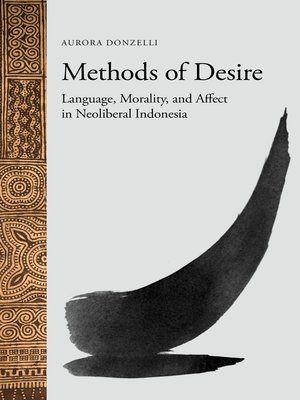
Sign up to save your library
With an OverDrive account, you can save your favorite libraries for at-a-glance information about availability. Find out more about OverDrive accounts.
Find this title in Libby, the library reading app by OverDrive.



Search for a digital library with this title
Title found at these libraries:
| Library Name | Distance |
|---|---|
| Loading... |
Since the Asian financial crisis of the late 1990s, Indonesia has undergone a radical program of administrative decentralization and neoliberal reforms. In Methods of Desire, author Aurora Donzelli explores these changes through an innovative perspective—one that locates the production of neoliberalism in novel patterns of language use and new styles of affect display. Building on almost two decades of fieldwork, Donzelli describes how the growing influence of transnational lending agencies is transforming the ways in which people desire and voice their expectations, intentions, and entitlements within the emergent participatory democracy and restructuring of Indonesia's political economy. She argues that a largely overlooked aspect of the Era Reformasi concerns the transition from a moral regime centered on the expectation that desires should remain hidden to a new emphasis on the public expression of individuals' aspirations.
The book examines how the large-scale institutional transformations that followed the collapse of the Suharto regime have impacted people's lives and imaginations in the relatively remote and primarily rural Toraja highlands of Sulawesi. A novel concept of the individual as a bundle of audible and measurable desires has emerged, one that contrasts with the deep-rooted reticence toward the expression of personal preferences. The spreading of foreign discursive genres such as customer satisfaction surveys, training sessions, electoral mission statements, and fundraising auctions, and the diffusion of new textual artifacts such as checklists, flowcharts, and workflow diagrams are producing forms of citizenship, political participation, and moral agency that contrast with the longstanding epistemologies of secrecy typical of local styles of knowledge and power. Donzelli's long-term ethnographic study examines how these foreign protocols are being received, absorbed, and readapted in a peripheral community of the Indonesian archipelago.
Combining a telescopic perspective on our contemporary moment with a microscopic analysis of conversational practices, the author argues that the managerial forms of political rationality and the entrepreneurial morality underwriting neoliberal apparatuses proliferate through the working of small cogs, that is, acts of speech. By examining these concrete communicative exchanges, she sheds light on both the coherence and inconsistency underlying the worldwide diffusion of market logic to all domains of life.







